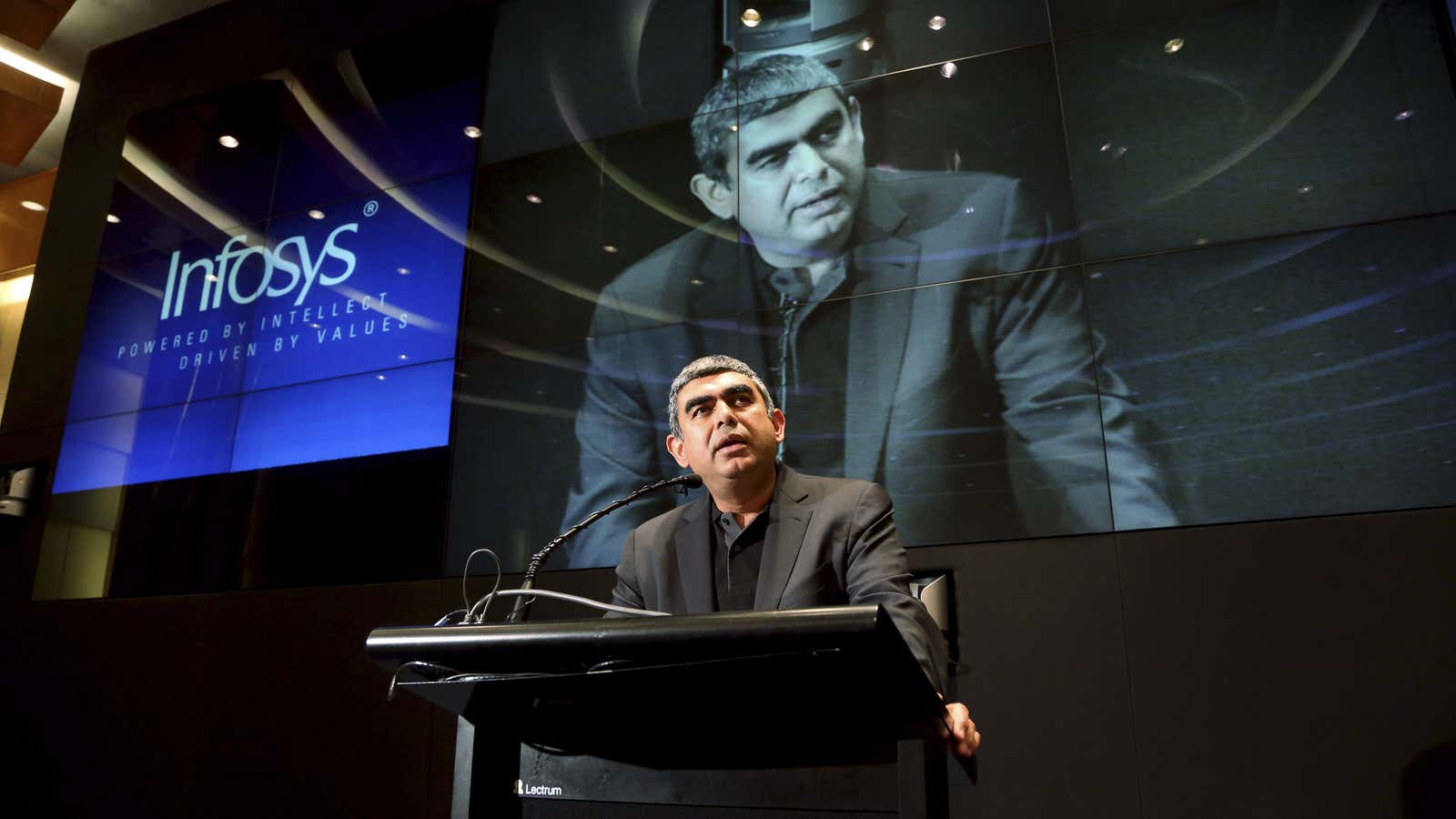I first read up about a certain Vishal Sikka in May 2014. A source tipped me off that afternoon about this American-Indian who had spent most of his career working at German software major SAP. He was now set to be the next CEO of Infosys.
Until then, India’s second-largest IT services company had never once appointed a non-founder as its CEO.
Soon I turned sceptical about the lead.
“What would Sikka do at Infosys? He would be a big misfit,” said the head of a Mumbai-based brokerage house when I called to discuss the possibilities. Other sources, too, had similar reactions. After all, Sikka’s qualifications and professional experience seemed out of sync with what Infosys primarily did.
The tipoff was spot on though. On Aug. 01, 2014, amid a flurry of incredulous questions, Sikka took over as the first “outsider” CEO of the Bengaluru-based IT behemoth.
Three years on, his abrupt decision to move on has left many heartbroken.
Sikka’s departure has cost Infosys a fortune already—Rs22,500 crore crore was wiped out of the company’s market value in one day (Friday, Aug. 18) as its shares tanked around 13% in intra-day trade in India and its American Depository Receipts (ADR) fell over 7%. On Aug. 21, the shares hit a three-year low despite a buyback announcement by the firm.
The loss is not Infosys’s alone. The Indian IT industry has lost a technocrat who broached fresh ideas such as design thinking and artificial intelligence (AI) that could ultimately lead to its transformation.
A different view
The 50-year-old was a rank outsider to the Indian IT industry when Infosys appointed him CEO. Sikka’s style of working and areas of expertise were unlike those of the other bigwigs in the sector.
Sikka holds a PhD in artificial intelligence from Stanford University. He joined SAP in 2002 and was appointed its chief technology officer (CTO) in March 2007. Three years later, he became a part of its executive board and managed up to $8 billion of its revenues.
He is known as the “father of HANA,” SAP’s fastest-growing product ever—in 2014, this platform was generating over $1 billion in revenue.
In November that year, I first heard Sikka talk about the Indian IT industry. In a video address at an industry event, he vehemently voiced his displeasure at what he saw:
“I was not deeply familiar with the services industry until recently. I find all of us in the industry on a downward spiral…It’s like a treadmill of increasingly lower cost, hiring people faster and faster, from more and more mediocre places, training people less and less, putting them into (a) job faster and faster. I think that is a wrong direction.”
This was almost counter-intuitive to what Indian IT CEOs had promoted for many years: cost-effective solutions, economising, mass hiring.
Sikka then went on to bring fresh ideas and practices to Infosys, which many of the company’s peers followed subsequently.
Sikka impact
Under Sikka, revenues grew from $2.13 billion in April-June 2014 to $2.65 billion in April-June 2017, a statement from Infosys said following his resignation.
“The company launched more than 25 new services which rose to 8.3% of revenue last quarter, from 0% in April 2015,” it said. “Under his leadership, Infosys developed and launched its artificial intelligence platform Nia, and already has over 160 artificial intelligence scenarios deployed with more than 70 clients. Infosys has also ventured into new horizons both with design-thinking with clients and its startup investment fund.”
Yet, while he was ready to turn the company around, its patriarch was not ready to let go entirely.
The outsider
Sikka’s functional approach, too, was alien to the Indian IT sector. For starters, unlike his predecessors and peers, he continued to live in the US. This made sense since he would be physically present in the company’s largest market, rather than operate from far away.
He also set off a visible churn in other areas.
For instance, Sikka added some verve to an otherwise colourless workplace: Infosys staff were now allowed casual dressing on weekdays and given access to social media at work. This was a much-needed move for the archaic Indian IT sector that’s desperate for talent at a time when the country’s startup ecosystem is booming.
Unlike most of his peers, he himself was quite expressive. An avid blogger, Sikka is also active on Twitter. He ventured beyond the company’s quarterly earnings, frequently penning his thoughts on technology and initiatives at Infosys, or writing haikus. This was unheard of in an industry where even CEOs’ Diwali or New Year’s Day letters to employees are well-guarded secrets.
Where processes and templates are deemed sacred, Sikka asked his employees to question the norms, speak up, and be curious.
“I want to thank Vishal for the evolution of our thought process,” an analyst said during the investor call post the announcement of Sikka’s exit.
Sikka’s moved on. Time for Indian IT to now play catch-up.
We welcome your comments at ideas.india@qz.com.
